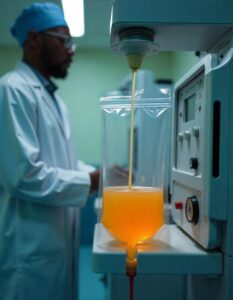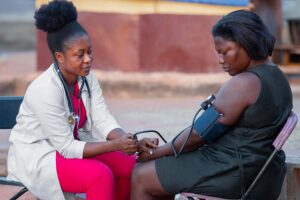Every day, countless lives are saved thanks to blood and plasma donations. In Nigeria, the importance of these donations cannot be overstated. Blood plasma donation, a key element of blood donation, plays a crucial role in medical treatments and emergencies. In this article, we’ll walk you through how plasma donation works, why it matters, and how you can get involved. With organizations like Oneus leading the way, we’ll also highlight the unique value of donating blood plasma through trusted plasma donation centers.
What is Blood Plasma Donation?
Blood plasma is the liquid portion of your blood, made up of water, proteins, and other vital nutrients. Plasma plays an essential role in maintaining your body’s circulatory system and supporting the immune system. It is primarily used for treating patients with conditions such as burns, liver disease, clotting disorders, and immune deficiencies.
While blood donation involves giving whole blood, plasma donation is slightly different. When you donate plasma, the plasma is separated from your blood cells using a process called plasmapheresis. Your red blood cells, white blood cells, and platelets are then returned to your body, leaving you with a refreshed plasma donation ready to be used for life-saving treatments.
The Importance of Blood Plasma Donation in Nigeria
Plasma donation has gained importance in Nigeria, especially with the rise of medical conditions requiring plasma-based therapies. Donating blood plasma is critical because it helps in the production of clotting factors, which are vital for patients suffering from hemophilia and other bleeding disorders.
Oneus in Nigeria, an established name in blood and plasma donation, is at the forefront of plasma donation initiatives. They provide a platform for individuals to donate safely while ensuring the plasma is used to treat those in need.
Blood Plasma Donation Process: Step-by-Step
If you’ve never donated plasma before, it may sound intimidating. However, the process is straightforward and generally safe. Here’s how blood plasma donation works:
-
Registration – You’ll start by completing a medical questionnaire and undergoing a quick physical check-up to ensure you’re eligible for donation.
-
Blood Collection – A needle is placed in your arm to draw blood. Your blood is then separated, and the plasma is collected.
-
Plasma Separation – Through plasmapheresis, your blood components are separated. Plasma is collected, while your red blood cells and platelets are returned to your body.
-
Post-Donation Care – Once the plasma donation is complete, you’ll be given fluids to help restore your blood volume. You’re advised to rest for a short while before leaving.
It’s that simple! Plasma donation usually takes around 45 minutes to an hour.
Key Considerations Before Donating Plasma
Before donating, ensure that you meet the following criteria:
-
Age: You must be at least 18 years old and in good health.
-
Weight: You must weigh a minimum of 50 kg (110 lbs).
-
Blood Group: While your blood type (A, B, AB, or O) may not affect plasma donation, some plasma donation centers may have specific needs.
-
Genotype & Rhesus Factor: Plasma donation centers may also ask about your genotype and Rhesus factor to ensure compatibility with certain patients.
-
Frequency of Donation: You can donate plasma up to twice a week, but it’s important to space out your donations for recovery.
Benefits of Donating Blood Plasma

Donating blood plasma isn’t just a gift to others; it can benefit your health as well. Here are some of the key benefits of blood plasma donation:
-
Health Check-Up: Every time you donate plasma, you get a free health check-up, helping to monitor any potential health issues.
-
Plasma Donation Benefits to the Skin: Donating plasma can help rejuvenate your skin, promoting a natural, healthy glow by improving blood circulation.
-
Helping to Save Lives: Plasma is used to treat a wide range of medical conditions, including burn victims, those with blood clotting disorders, and even cancer patients.
Risks Associated with Not Donating Plasma
Not donating plasma, especially when you’re eligible and healthy, can have severe consequences. Plasma is in constant demand for medical treatments. Without enough donations, hospitals and clinics may struggle to treat patients, leading to increased mortality rates for those relying on plasma-based therapies.
Plasma Donation Centers and Locations in Nigeria
Looking for the best places to donate plasma in Nigeria? Oneus offers safe, hygienic plasma donation centers where you can donate your plasma and make a life-changing difference. These centers are equipped with modern facilities and staffed by trained professionals to ensure a safe donation process. Simply visit Oneus’s website or contact their team to find the nearest plasma donation center to you.
Why You Should Give Blood Plasma
Donating blood plasma is one of the most impactful ways to give back to your community and help save lives. The need for plasma donations in Nigeria is immense, and you can make a real difference by stepping forward. Whether it’s through private cord blood banking, blood plasma donation, or platelet donation, every donation counts.
Call to Action: Give Blood, Save a Life
Are you ready to make a difference? Donating plasma is an incredible way to give back to your community. Book your blood plasma donation today and become a hero to those in need. For more information, contact Oneus at info@oneusng.com or call +234 902 168 2822. Visit www.oneusng.com to learn more and book your donation now.
Give Blood, Save a Life – Book Your Donation Today!




